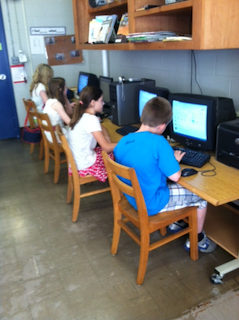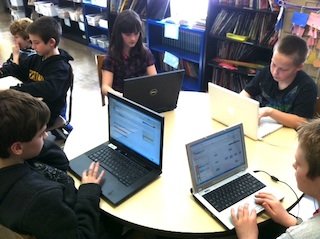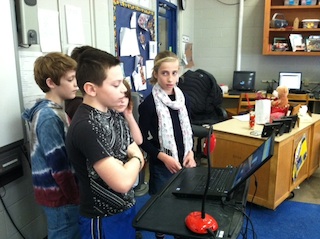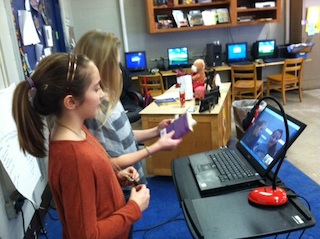 Can writing about what they read be an “authentic” experience for students in today’s public schools? I believe it can be, but it’s far from common, given the mandated reading and writing curriculum frameworks in New Hampshire and, I’m sure, many other states.
Can writing about what they read be an “authentic” experience for students in today’s public schools? I believe it can be, but it’s far from common, given the mandated reading and writing curriculum frameworks in New Hampshire and, I’m sure, many other states.
A lot must change in education for literacy learning to be truly authentic. Right now, it’s difficult for me to create frequent opportunities for my students to read and write with true purpose. When I force my students to “do” all that the curriculum commands, I stifle their enjoyment of literacy.
I want to help kids improve as readers and writers and find pleasure in doing so. To me, authentic literacy learning has two goals: to help students develop a passion for reading and writing, and to help them learn to implement the strategies that adult readers and writers utilize for genuine purposes.
Not only do I think students should choose the material they read at school and home, they should also read like writers and learn how to write well about self-selected topics and in their favorite genres. Writing well about what interests them most in their personal lives helps assure they will become be more successful in the world beyond school.
In fact, I believe that all significant pieces of writing should be written for an actual audience. This way students have an extra incentive to write well because people beyond their teachers and parents will read their work. With the massive and constantly growing availability of Web 2.0 tools, students will always have access to an audience. Today people across the world can view students’ creations and help push their thinking forward through commenting. This truly excites me and gives me hope that education can and will improve.
Blogging can help deepen thinking
Since my students have been “allowed” to blog these past few years, they’ve been demonstrating deeper thinking than ever before, as they master the art of writing and commenting on posts. Recently I’ve been trying to figure out how what they write about their fictional reading might become more meaningful. Through our blogging, we’ve “covered” most of the state curriculum requirements for writing about nonfiction. But the state also dictates that my students write about the fiction they read, and I am bound to follow that dictate because my students are tested on the “skill.”
 This is my tenth year of teaching. Every year (except for this one) my students have written a response to their reading about twice a month. For my first eight years, my students were assessed with a rubric that was created by a team of teachers whom I deeply respect. My teammates and I revised the rubric every year in attempt to enhance our students’ learning. But there came a point, for me, where even that was not good enough.
This is my tenth year of teaching. Every year (except for this one) my students have written a response to their reading about twice a month. For my first eight years, my students were assessed with a rubric that was created by a team of teachers whom I deeply respect. My teammates and I revised the rubric every year in attempt to enhance our students’ learning. But there came a point, for me, where even that was not good enough.
The first incident that had me questioning the validity of the reading response involved a high achieving student who successfully composed writing pieces that met all of our “A” requirements — but he never came close to demonstrating the deep thinking of which I knew he was capable. I believe the rubric deflected him from writing brilliant responses. Why bother when the extra thinking and reaching promised nothing more than the highest grade he was already receiving? I compassionately called him out on this and he laughed. We laughed. How could I blame him?!
Another time, I had an uncomfortable parent/teacher conference with parents whom I respect. They were concerned that the reading response assignments were frustrating their daughter because the rubric made writing an onerous chore. They were right. The rubric-driven reading responses were not making her a better reader and writer and thinker; in fact, they were harming her self confidence and making her detest literacy. That was the opposite of my intention.
Last year, I got rid of the rubric
I had my students write blog posts where they reflected on their reading. At the time, it seemed perfect! Instead of assessing each reading response with a rubric, I gave one specific positive comment as well as a suggestion intended to push each student to improve on the next assignment. Not only were my comments visible for all students and parents to read, my students now had access to the best work — models that could help them improve their own responses.
This was evolving fairly well, although I had a parent imply that her child was not working as “hard” as she should because she was not receiving a grade on every response. I explained that I wanted my students to become eager readers and writers rather than write a response solely to get a good grade. (Grades: another topic for another time!)
At the end of the year, my students and I reflected on the reading response blog posts about their fiction reading. We were honest. They did not enjoy writing them, and I did not enjoy reading them. The mandated responses, even without the grades, remained meaningless.
So what’s the answer?
I have thought a lot about this dilemma. I am an avid reader and writer; however, I NEVER write a response about my reading of fictional books. I do talk about fiction with my book club girlfriends (for about fifteen minutes a month). And I often model my deep thinking about what I’m reading to my students during classroom lessons and conferences. But I NEVER write about my fictional reading just for the heck of it.
 More importantly, what do students learn from writing about their reading that they cannot learn from talking about it in book-club style? Nothing! I don’t think writing about their reading makes students better readers or writers (unless, perhaps, they plan to become professional book reviewers).
More importantly, what do students learn from writing about their reading that they cannot learn from talking about it in book-club style? Nothing! I don’t think writing about their reading makes students better readers or writers (unless, perhaps, they plan to become professional book reviewers).
This year I stopped assigning the reading responses altogether. It no longer felt right. I have been respectfully questioned, again, about whether I am preparing my current students as well as my previous students. Some parents truly miss the reading responses. I clarify that my current students are more prepared than before because they truly comprehend what they are reading through asking questions, making connections, creating multi-sensory mind pictures, making inferences, and finding the author’s message.
I can provide evidence that my students are successfully able to write any message clearly, and with great voice, regardless of the topic and genre. My students love to read and write because they choose their own topics and they read and write often. They are constantly reflecting on their literacy goals and creating new ones, thus becoming excellent readers and writers as well as passionate ones who trust the learning process. All of this is so much more meaningful than making them write about their reading which creates resentment. (Read a little more about this idea here.)
But the tension between what others expect and what I can see is working keeps resurfacing. It’s not so much the parents as the state curriculum, which expects that students will write about both their fictional and nonfictional reading. If I don’t find a purposeful way for them to do this, I’m neglecting my job.
A fresh idea: virtual book clubs
 Recently Amy Cantone, a fellow PLPeep who also teaches in New Hampshire, solved part of this problem for me. She asked me to combine our fifth grade classes for virtual book clubs. Our students selected a book they wanted to read. Amy and I have created various groups based upon student choices, and each group has selected the pace at which they are going to read their book. We are both modeling this process to our class during reading lessons.
Recently Amy Cantone, a fellow PLPeep who also teaches in New Hampshire, solved part of this problem for me. She asked me to combine our fifth grade classes for virtual book clubs. Our students selected a book they wanted to read. Amy and I have created various groups based upon student choices, and each group has selected the pace at which they are going to read their book. We are both modeling this process to our class during reading lessons.
Currently our students are posting their thinking about their fictional reading on Edmodo, a secure social network made for education. Book club members read and push each other’s thinking deeper through their replies, as well as during live Skype sessions. Such powerful documentation!
This is what I think learning should be all about. Through this book club activity, my kids are having “authentic” experiences and learning skills they can apply in their real world. It’s only fair. It’s the best way I’ve found so far to help foster passionate life long learners who think deeply through collaboration — and avoid breaching my professional obligation.
Rachel Small
Latest posts by Rachel Small (see all)
- Reflecting on Reflection - March 12, 2013
- Twitter-Hacked! - July 10, 2012
- Teaching Poetry the Connected Way - May 1, 2012


Virtual book clubs!! This is great! Interactive discussion about fiction is what really helps us all think more deeply about the elements of a good story. With the National Common Core Standards moving students from a balance of fiction and non-fiction, toward a majority of non-fiction, this adjustment makes good sense, in my humble opinion!!
Thank you, LeeAnn. Let me know if your students would like to join in one of our virtual book clubs!
I always strive to make learning authentic for the students of the schools and teachers I work with. You might be interested in the lastest authentic fiction idea I have created for a year 8 class of students: http://dakinane.com/blog/2012/04/03/the-hunger-games/
David, thank you so much for sharing. My kids are LOVING the Hunger Games right now and I can’t wait to show them your post tomorrow to see if they’re interested. (I’m sure they will jump right on it but I like to them give them the choice first.)
Rachel, I too have used reading responses to get kids writing aout the books they read (I assigned a genre-a-month to expand their tendencies to read all SF, all realistic, etc). They became overwhelming, however, which was the driving reason for discontinuing them this year. They each have a blog and what I had intended was for them to comment on each others; what happened was “I finished what I had to” and then.. nothing else. No conversations. The book club idea is a logical alternative; we also have edmodo and I’m curious to see what comes of your endeavors. Without a rubric, how does one fairly evaluate them?
Ginny, I appreciate your connection to reading responses. I’ve had a lot of success with kids writing about their specific use of metacognition while reading on Edmodo. I really think my students are invested in this “assignment” because they are truly engaged in discussion with kids from other schools (in addition to their own classmates).
I don’t REALLY know how to fairly grade my students. I only assign them a grade once a quarter but I often give them feedback. I meet with each student and together we review his/her comments to assess if he/she went above the grade level expectation: A+, met the grade level expectation: A, approached: B, below: (depends). The best evaluation, I think, is to get rid of grades all together and to continue to give them feedback about one specific aspect they did well and something constructive they can use to grow as a reader and a writer.
If you have any ideas, please let me know!
I think many teachers struggle with exactly what you describe–how to shift from artificial to authentic engagement with text and community. You are finding ways to engage your students AND support their learning. The pressures to continue with the written responses is predictable, but you’re so right. In the “real world” we are more likely to discuss literature than respond in writing to an adult with a rubric. 🙂
Adding the audience of same age peers increased the relevance for students. I think it also added the element of reciprocity, and that adds a real energy to learning.
Two authors whose work I have found helpful in designing meaningful learning processes with literature are Harvey Daniels and Faye Brownlie.
Thanks for sharing your reflections with us.
Maureen
Thank you for your comment, Maureen! I aspire to make everything my students spend time on be relevant although it’s sometimes difficult…
I love your description of how the virtual book clubs “added the element of reciprocity.”
Harvey Daniels is wonderful and I can’t wait to learn about Faye Brownlie!
Rachel,
This post certainly but a light on an issue in education that is under disucssion; authentic learning. If our classrooms are places in which authentic learning takes place, if they are places in which learning reflects the life and interets of our students, then the “way” we assess skills really do have to change. This is indeed a difficult process because change, no matter how small, is hard! Keep up the good work!
Thank you so much. I totally agree with you. If you figure out how to authentically assess skills, please let me know!
I’m working hard right now to increase the authentic learning in my second language classroom – moving farther away from “drill and kill”, and into more reality-based contexts, but we are, naturally, limited by the fact that we live in a largely unilingual English community. Starting to think about how I use the web to help my students engage with first-language French speakers…
I admire your goal of ditching the teaching practice of “drill and kill.” I’m sorry that I am clueless when it comes to teaching students who do not primarily speak English. If I find any great sources, I will reply again to your comment.
Rachel,
I’ve been using Edmodo with my seventh graders this year. It began as an experiment, and I’m still figuring out how to make it useful. Your ideas definitely spark more ideas for me.
Do you post questions or polls or other ‘sparks’ to get kids started in conversation? Do you have guiding questions to let kids know what you expect of their conversation? I’m curious to know more about how the virtual book club is structured.
Hey Sarah,
I try to let my students guide the book discussions independently; however, when I see a lacking conversation, I do try to intercept by posting a quality comment. Prior to the start of the online book discussions I do A LOT of modeling of what quality and authentic conversations look like.
I encourage my students to use the same language that we use during class and our conferences such as, I wonder, I think, I see, I connect, I infer, I predict…
You can see more of how I structure virtual book clubs with this Google Doc link: https://docs.google.com/document/d/1Il_jDKNNGnDmtOXIknX_BoNUpXiWHVIN1JaDXJX_WOI/edit
Rachel, Like you, what drives my teaching is my passion for reading and writing. And I often ask myself, as we are asking students to (fill in the blank) do REAL readers and writers do this? In my case, I do respond to my reading in a thoughtful manner, in my journals. However, I see that most readers probably do not. But if we ask our students to write in response to their reading, doesn’t it make them pause and really think about their reading in a more in depth way? Just thinking…
Hey Jim. Thank you for sharing your thoughts. I’ve been waiting for someone to offer your question and I appreciate how you kindly pushed my thinking deeper. I admire that you authentically respond to your reading in your journal and I wish I that had the passion to do so when reading fiction. (I actually do document my reflections to my nonfiction reading because it helps me learn better.)
I do think it’s VERY important for us to make our students “pause and really think about their reading in a more in depth way.” I fear that making kids write formal reading responses when they detest the process, shatters their passion for reading and writing. I do have some students who choose to write blog posts on their thinking about their reading and I encourage them to do so; however, I don’t want to kill my students passion for literacy by dictating them to do so if they don’t enjoy it and find it meaningful.
I am trying to find alternative ways for students to document their in depth thinking about their reading. They write about their thinking on sticky notes, their reading goal reflections and now through virtual book clubs.
If I can find a way to get my kids to want to write traditional reading responses, I will assign them again. Do you have any suggestions?
Hi Rachel,
Your article could not have been more timely as I reflect on this past year and look forward to next year. I am the only one at my school doing reader’s workshop (the rest use the basal, with some literature books that have many worksheets to complete!)
I too, started the year with reading response letters and rubrics- they were a struggle for kids to complete, and they were not authentic. I abandoned them, and moved to literature circles with specific roles-my kids did amazing, going far beyond their roles into authentic and engaged talk. But how could I capture that and prove to parents their progress? I had the kids rate their group and themselves (did they come to group prepared? Did they do thier job? Did they add to discussion? Did they stay on task?). This worked out ok, but I still need to tweak. I like the idea of edmodo and virtual lit groups, so i may give those a try.
I have a couple of teachers from another school coming to observe my readers workshop next week. I am somewhat scared to show them my kids notebooks and explain how I kept changing things up. Will they see this as failure? How will they see evidence of learning? Despite my nervousness, I am determined to spread the word about reader’s workshop!
Thanks again!
Jill Croft
Ps- i have a great student named Rachel Small this year in my class!